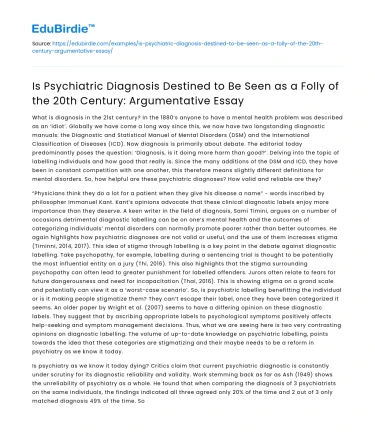What is diagnosis in the 21st century? In the 1880’s anyone to have a mental health problem was described as an ‘idiot’. Globally we have come a long way since this, we now have two longstanding diagnostic manuals: the Diagnostic and Statistical Manuel of Mental Disorders (DSM) and the International Classification of Diseases (ICD). Now diagnosis is primarily about debate. The editorial today predominantly poses the question: ‘Diagnosis, is it doing more harm than good?’. Delving into the topic of labelling individuals and how good that really is. Since the many additions of the DSM and ICD, they have been in constant competition with one another, this therefore means slightly different definitions for mental disorders. So, how helpful are these psychiatric diagnoses? How valid and reliable are they?
“Physicians think they do a lot for a patient when they give his disease a name” - words inscribed by philosopher Immanuel Kant. Kant’s opinions advocate that these clinical diagnostic labels enjoy more importance than they deserve. A keen writer in the field of diagnosis, Sami Timini, argues on a number of occasions detrimental diagnostic labelling can be on one’s mental health and the outcomes of categorizing individuals’ mental disorders can normally promote poorer rather than better outcomes. He again highlights how psychiatric diagnoses are not valid or useful, and the use of them increases stigma (Timinni, 2014, 2017). This idea of stigma through labelling is a key point in the debate against diagnostic labelling. Take psychopathy, for example, labelling during a sentencing trial is thought to be potentially the most influential entity on a jury (Thi, 2016). This also highlights that the stigma surrounding psychopathy can often lead to greater punishment for labelled offenders. Jurors often relate to fears for future dangerousness and need for incapacitation (Thai, 2016). This is showing stigma on a grand scale and potentially can view it as a ‘worst-case scenario’. So, is psychiatric labelling benefitting the individual or is it making people stigmatize them? They can’t escape their label, once they have been categorized it seems. An older paper by Wright et al. (2007) seems to have a differing opinion on these diagnostic labels. They suggest that by ascribing appropriate labels to psychological symptoms positively affects help-seeking and symptom management decisions. Thus, what we are seeing here is two very contrasting opinions on diagnostic labelling. The volume of up-to-date knowledge on psychiatric labelling, points towards the idea that these categories are stigmatizing and their maybe needs to be a reform in psychiatry as we know it today.
Save your time!
We can take care of your essay
- Proper editing and formatting
- Free revision, title page, and bibliography
- Flexible prices and money-back guarantee
Is psychiatry as we know it today dying? Critics claim that current psychiatric diagnostic is constantly under scrutiny for its diagnostic reliability and validity. Work stemming back as far as Ash (1949) shows the unreliability of psychiatry as a whole. He found that when comparing the diagnosis of 3 psychiatrists on the same individuals, the findings indicated all three agreed only 20% of the time and 2 out of 3 only matched diagnosis 49% of the time. So, if psychiatrists can’t agree on what mental disorder to categorize to someone, who is profiting from diagnosis? In her highly read-worth blog, Lucy Johnstone, shadows this notion that diagnosis as a whole is unreliable. She says, the Chair of DSM-IV, Dr Allen Frances, has described the manual as ‘deeply flawed and scientifically unsound’ while the current Institute of Mental Health confirms that its categories ‘lack validity’ (Johsntone, 2015). If those that devised these diagnostic manuals are questioning the design and diagnosis as a whole, them why should us ‘idiots’ follow it. Are we given these labels from psychiatrists to endorse pharmaceutical companies? Cosgrove and Whitaker, both very devoted writers in the field, highlight in their book that the financial interests of the pharmaceutical industry and the guild interests of the psychiatric profession overly guided the DSM-V to expand further and create more psychiatric diagnoses. Similarly, Allen Frances wrote that 70% of the DSM-V task force members reported to have financial relationships with pharmaceutical companies, he also mentions that the DSM made over one hundred million dollars for the American Psychiatric Association (Frances, 2015). This evidence suggests that the psychiatrists and the APA are no longer doing it for the peoples’ benefit, but for their own advantage. The research in the area of the pharmaceutical industries relationship with the DMS is sparser than hoped, extended research is important to gain a deeper understanding of how much they influence psychiatry as we know it and would prove useful in the diagnostic debate.
In conclusion, to answer the question ‘Is psychiatric diagnosis destined to be seen as a folly of the 20th century?’, in sum, yes. Once given a psychiatric label it’s almost as if it’s stuck with you for life, you can’t shake it off and that’s the way society wants it to be, but it’s time for change. How fair is it to stigmatize individuals just because of a disorder has been classified to them? The reliability of the DSM and ICD has also come into question and leads onto who benefits? It seems like the only ones not profiting from their diagnosis is the ones who it’s given to.






 Stuck on your essay?
Stuck on your essay?

